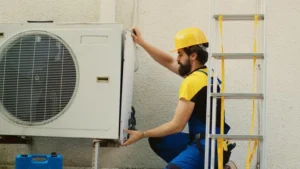
By Admin
Avoid common AC mistakes that increase energy bills. Learn simple tips and solutions to improve efficiency from a reputed AC repair service.
Air conditioners are lifesavers, especially in places with hot and humid climates. However, despite their widespread use, many homeowners unknowingly commit errors in operating or maintaining their AC units, leading to inflated energy bills. These common AC mistakes not only drain your wallet but also decrease the efficiency and lifespan of your air conditioning system.
In this comprehensive guide, we’ll delve into the most frequent AC mistakes, their impact on energy consumption, and practical ways to avoid them. Whether you’re a first-time AC user or someone looking to reduce their electricity costs, these insights will help you make informed decisions and keep your cooling system in top condition.

Modern air conditioners are designed to be energy efficient, but their performance depends largely on proper usage and maintenance. Mistakes like neglecting maintenance, using incorrect thermostat settings, or ignoring airflow issues can strain your AC, causing it to consume more energy than necessary.
These small oversights can accumulate over time, leading to hefty energy bills, avoidable repairs, and a shorter lifespan for your unit. Addressing these issues requires knowledge and action, and that’s exactly what we’ll focus on in this article.
A common misconception is that lowering the thermostat temperature will cool your room faster. In reality, air conditioners work at a constant rate, regardless of the set temperature. Setting the thermostat too low only makes your AC run longer, increasing energy consumption and wear.
Skipping routine AC maintenance is one of the most significant contributors to energy inefficiency. Dust, dirt, and debris can clog critical components like coils and filters, making the unit work harder to cool your space.
Air filters play a crucial role in maintaining airflow and indoor air quality. Dirty or clogged filters restrict airflow, causing the AC to work harder and consume more energy.
Insufficient insulation allows cool air to escape and warm air to enter, forcing your AC to overwork.
Leaving windows or doors open while running the AC is one of the easiest ways to waste energy. Warm air from outside continuously flows in, while the cool air escapes, causing your unit to run excessively.
The outdoor unit is often overlooked during regular cleaning and maintenance. A dirty or blocked outdoor unit can’t expel heat effectively, reducing the overall efficiency of the AC.
Cooling empty or rarely used rooms is a common mistake that unnecessarily increases energy usage.
Many people turn their AC on and off repeatedly to save energy, but this approach does more harm than good. Each restart causes the system to consume additional power and puts unnecessary strain on the components.
Placing your thermostat in a location exposed to direct sunlight or heat-generating appliances can result in incorrect temperature readings, causing the AC to overcool your space.
To maximize your AC’s efficiency and minimize your energy bills, consider the following advanced strategies:
Routine maintenance is critical to avoid the common AC mistakes that lead to higher energy bills. During professional servicing, technicians check components like refrigerant levels, coils, and filters to ensure optimal performance. Neglecting these checkups can result in inefficiencies, increased wear, and even system failures.

Clean or replace your air filters every 1-3 months, depending on usage and air quality.
Yes, poor insulation allows cool air to escape, making your AC work harder and increasing your energy consumption.
For energy efficiency and comfort, set your thermostat between 24–26°C.
No, covering the outdoor unit can block airflow and trap moisture, which may damage the system.
Use a programmable thermostat, block sunlight, and ensure your home is well-insulated.
Common AC mistakes can cost you more than just money—they also reduce the lifespan of your cooling system and impact your comfort. By following the tips outlined in this guide, you can enhance your AC’s efficiency, lower your energy bills, and enjoy a comfortable home environment.
If you need professional assistance, You can contact at the best AC repair services in Kolkata to help you maintain an efficient and long-lasting system. Their expert team can identify and resolve inefficiencies, ensuring your AC operates at peak performance.
Take action today to avoid these common AC mistakes and enjoy stress-free cooling all year round!